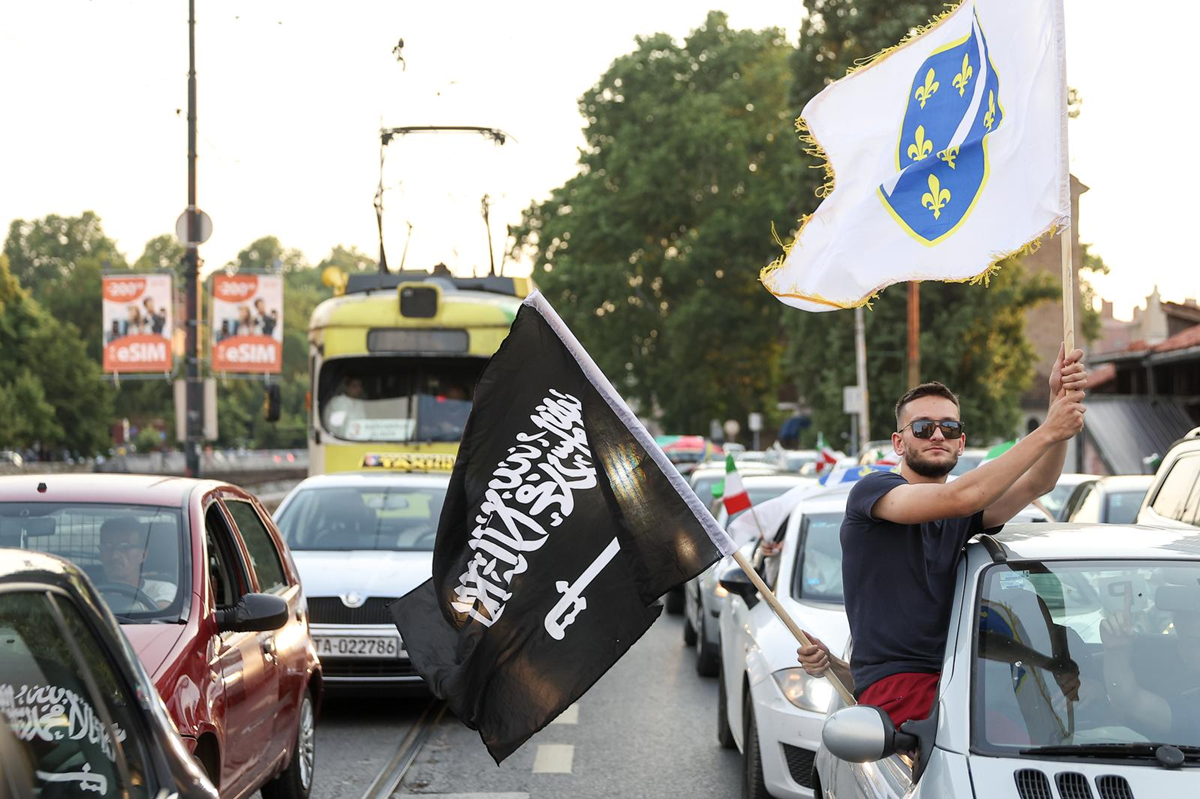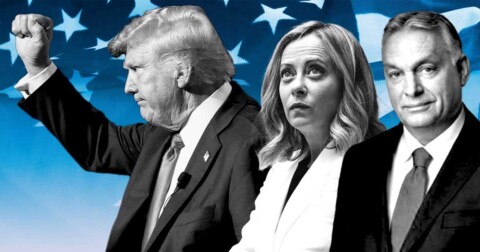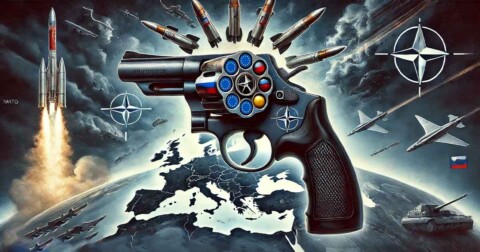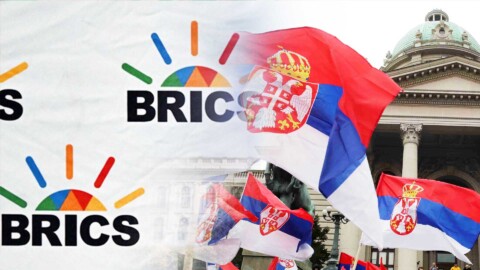If we rationally analyze the internal and external position of Republika Srpska, it seems better than ever, and here is why. Looking at the external side, Srpska has all three superpowers on its side: Russia – for a long time, openly and directly; China, somewhat more discreetly; and the United States – passively. Paradoxically, the President of Srpska, who is individually the most responsible for this, has almost ended up on an Interpol wanted list. And here is how that looks from within Bosnia and Herzegovina.
SCHMIDT WAVES THE WARRANT, DODIK TRAVELS
Let’s start with Schmidt, who is supposed to act as a mediator between the external and internal levels — between the international protectorate and domestic democracy. He has lost his protectorate authority, and his decisions are no longer taken seriously even in Sarajevo, because he is unable to implement them, while in Banja Luka his decisions are preemptively annulled as illegal, unconstitutional, anti-Dayton — just like his status as High Representative is false. And what decision could he even make when he has already fired all his ammunition at Dodik and missed? While he waves a warrant rejected by Interpol, Dodik travels to Israel, Hungary, Russia, and Serbia — making Schmidt look ridiculous. He keeps summoning the Bosniak trio, Čović, and the opposition from Republika Srpska, trying to cobble together a majority that could push SNSD out of government — but it all leads nowhere.
The Croats have decisively turned against Bosniak unitarism. Čović has aligned himself with Dodik, a move supported by both Milanović and Plenković in Zagreb, and in Muslim Sarajevo, Čović has become public enemy number two. There’s an objection that he’s an unreliable partner and that his alliance with Dodik is only temporary and tactical. But this isn’t about personal loyalty of the Croatian leader — it’s about the symmetrical position of the two peoples in Bosnia and the fact that, due to Bosniak dominance, even pro-Bosnian Croats have been sidelined by the Herzeg-Bosnians.
The Bosniaks have lost U.S. support. Solidarity from the Islamic world offers little comfort at a time when their Sunni Muslim brothers — Palestinian civilians — are dying en masse in Gaza, and Shiite Iran is exchanging unequal fire with Israel.
The European Union is divided over Bosnia as well, thanks to Orbán and Fico. Ursula von der Leyen keeps calling meetings, thumping her chest over European unity and joint investments in common and Ukrainian military projects — but when leaders return home and crunch the numbers, they back out. Her efforts to remove the veto or introduce a “consensus minus x votes” policy are failing, and even founding EU members like France and Germany are increasingly acting independently as sovereign states. This leaves the Bosniaks with only one old ally — Germany — which now seems more concerned with what to do with Schmidt than with them.
TWO BOSNIAK OWN GOALS
The other day, they scored two own goals. The first was by Adnan Delić, a minister in the BiH government, who canceled the hotel reservation for the European Rabbinical Conference, which was scheduled to begin the next day in Sarajevo. A minus for the Troika, a plus for Izetbegović — still the most prominent Bosniak political figure, who, unlike Nikšić, Bećirović, and Konaković (collectively and impersonally called “the Troika”), is referred to by his full name. He is likely to take a seat in the BiH Presidency in next year’s elections, while the SDA returns to parliament. But then it turned out that the hotel director, Jasmina, bears the surname Izetbegović — she is Bakir’s daughter and Alija’s granddaughter, and probably a family co-owner of the Swissôtel.
The second own goal for the Bosniaks came from Zukan Helez, the BiH Minister of Defense, who, just two or three days before the start of the American missile strikes on Tehran, held talks in Sarajevo on military cooperation with Iranian generals. Washington responded angrily, prompting Zukan to panic and offer a hundred apologies — as everyone still remembers what happened to Hasan Čengić and Bakir Alispahić after the CIA discovered a secret Bosniak-Iranian terrorist camp in Pogorelica near Sarajevo shortly after the war.

AFTER THE RABBIS, THE PERSIANS
Poor Zukan — he figured that since Trump had distanced himself from Bosnia and Herzegovina, the time had come to renew old ties and place “Bosniak innocence without protection” under the patronage of a Muslim — even if Shiite — great power. After all, the Sunni monarchies and dictatorships in the Middle East show more verbal than actual solidarity when it comes to Palestine. Prince Salman of Saudi Arabia, just next to Mecca and Medina, is striking billion-dollar business deals with Trump. The EU is preoccupied with internal divisions over Ukraine, and with Erdoğan, you never really know… Meanwhile, Tehran clearly sensed the geopolitical moment to extend a hand to the leaderless Bosniaks. All in all, with both own goals — the one involving the rabbis and the one involving the Persians — the scorers, Adnan and Zukan, managed to hit it like a finger straight into manure.
Finally, what can the “Troika” — the ruling coalition in the Federation of BiH — actually do to pull themselves, their people, and Bosnia and Herzegovina out of this dead end? A prolonged stalemate benefits Republika Srpska, allowing it to continue on its own path — to adopt a new constitution, implement its own election law, and take over policing of the external borders of the entity, which it is entitled to under the original Dayton Agreement. If the Troika strikes a deal with Čović and gives up on Komšić, the Bosniak public would perceive it as a national defeat — so much so that they might not even bother voting. On the other hand, if they accept dialogue with Dodik, things could turn out even worse for them. That leaves them with only one move: to bring the President of Srpska to Sarajevo in handcuffs. For the Bosniak public, such a moral and psychological act would be a triumph comparable to the 1992 independence referendum and UN admission.
FATWA FROM UKRAINE
It has proven to be a mission impossible, as the federal police are incapable, SIPA’s jurisdiction is limited, EUFOR has no mandate — yet political Sarajevo has no alternative and refuses to give up. It continues to try everything from issuing a local warrant, requesting an Interpol red notice, holding military exercises and maneuvers around Brčko, to things we can only speculate about. There were suspicions that SAS operatives might kidnap him in a helicopter operation on his estate or intercept him somewhere — but let’s recall Đinđić and the sniper from a distance.
Today, we see the existence of satellite target tracking and killer drones, which Israelis have used with monstrous precision and efficiency to eliminate the top leadership of Iran’s army and Revolutionary Guard. That these are not just idle speculations is supported by a fatwa of sorts that came for Dodik — from Ukraine. On the Kyiv-based extremist website “Myrotvorets,” he has been marked, alongside Robert Fico, Orbán, and Lula da Silva, with similar reasoning — that they “supported Putin’s special operation and threatened the sovereignty of Ukraine.”
One might wonder why Zelensky, with fires burning under his feet, would bother with Russian sympathizers. But it was recently “revealed” that Ukrainian special forces allegedly mined Nord Stream 2, deep beneath the Baltic Sea. It turns out that this proxy state — whose territory is already reduced by 30%, and whose mineral-rich underground has been sold off to private investors from its Western allies — has nothing more urgent to do than threaten Dodik for a verbal offense. It’s becoming obvious that Ukraine has become a transparent front for a wide range of Western operations that have now extended to Bosnia and Herzegovina, namely Republika Srpska and Serbia. Suspicion — to say the least — once again falls on the “Great British,” grandmasters of a hundred years of experience in neocolonial intelligence and diplomatic intrigues. Was it not Boris Johnson who wrecked the Minsk Agreements — or rather, the already signed agreement in Istanbul?!
DIVISION OF SPHERES OF INFLUENCE?
Despite the dangers, the internal and external context for Republika Srpska is currently very favorable. However, this global landscape is dramatically shifting day by day. The Israeli/American war against Iran — which also constituted an indirect attack on its strategic allies Russia and China — ended quickly. Putin warned that Russia has obligations toward Iran and that it’s up to Tehran to decide what that entails; China expressed a similar stance on the matter. Trump has no reason to push further after such a diplomatic warning — he has already fulfilled the demands of Israel and the Jewish lobby in the U.S., demonstrated strength to the world, and portrayed himself as a decisive president to domestic opponents and the American public. It won’t be hard for him to rein in Bibi (Netanyahu), as this war revealed that Israel is not invulnerable — that the Iron Dome is porous — while Iran has not yet even deployed the most powerful weapons in its arsenal. And even with what it has shown, it managed to bomb U.S. bases across the Middle East, just as it had boldly announced.
In the coming period, Russia, China, Iran, and several other BRICS members are expected to expand the CSTO (Collective Security Treaty Organization). Iran will likely acquire doomsday-level nuclear weapons and establish military parity with Israel — which, paradoxically, may become the strongest guarantee of peace and stability in the region. Does all of this suggest a tacit agreement between superpowers to divide spheres of influence?
What is certain is that Putin is winning in Ukraine, and that this will result in some sort of deal with Trump — though where the final front line will be drawn remains uncertain. Putin, now more confident than ever, declares: “Where the Russian soldier steps, that is Russian land!” and “Russians and Ukrainians are one people; Ukraine belongs to us in its entirety.” Equally clear is the fact that the European Union, as a unified entity, no longer exists. What remains are France, Germany, then Italy, Spain — and then Hungary, Slovakia, Serbia…

TRANSFER OF MIGRANTS FROM EUROPE TO THE BALKANS
There is a part of Europe called the Balkans, and within the Western Balkans lies a land called Bosnia, and within it the Republika Srpska — a beacon of the reaffirmation of nations and the re-sovereignization of states. At the same time, there is Britain, which left the EU “because Churchill said that the Proud Albion must be both the Commonwealth, and Europe, and a transatlantic bridge to the USA,” and the Queen Mother “heard no convincing reason to stay.” In truth, it couldn’t stomach early European equality, nor being anything less than exceptional — especially as Germany began to rise after unification. De Gaulle once said, “Britain should never be admitted into the EU.”
And now, that same Britain is aiming to replace America within the EU — the very union it exited — exploiting the competition between Germany and France in Brussels, and seeking to dominate the European Balkan backyard in Serbia and Republika Srpska. During his visit to Belgrade, Foreign Secretary James Cleverly (nicknamed “Lemi”) declared that Serbs should not blame Britain… When Vučić mentions foreign services involved in Serbia’s internal unrest, he never names which ones. The same minister, a descendant of Black slaves from Britain’s colony of Guyana, publicly supported an OSCE project to transfer hundreds of thousands of migrants from Western Europe to the Balkans. Albania has already accepted the well-paid arrangement, and among the potential clients are North Macedonia and Bosnia and Herzegovina.
BY BOATS TO THE PROMISED LAND
It’s an old story! Margaret Thatcher’s chief of staff once recorded part of her private conversation with Helmut Kohl. This was during the wave of Islamic terrorist attacks on London and Madrid subways, and on Charlie Hebdo in Paris, which claimed many lives. The British Prime Minister and the German Chancellor concluded that Muslim immigrants, even after several generations, neither want to nor can integrate into non-Muslim societies — and that they should be returned to their countries of origin.
Then came the migrant tsunami from the Middle East — a consequence of color revolutions and the overthrow of dictatorships in the name of democracy and human rights in the Arab world. Saddam, Mubarak, Gaddafi, Ben Ali, and others were toppled, but their countries were devastated and thrown decades backward, while waves of people set off in boats toward the promised land in Western Europe. While Angela Merkel flung open the doors to cheap labor for Germany’s overheated industry, Viktor Orbán raised fences at the border to prevent the flood of migrants from changing the demographic profile and cultural identity of Hungary. He was fiercely criticized by Europe’s neoliberal majority, but once Germany’s needs were met, the migrants were stopped at the EU borders and, in tents, formed a reserve pool for selective admission — mostly through Croatia, near Bihać. Dodik allowed them only to pass through Republika Srpska under escort to the larger entity, but just as the pressure began to ease, the ongoing war in the Middle East signaled the beginning of a new wave of refugees.
USING “UNADAPTED” MIGRANTS TO GAIN DOMINANCE IN BOSNIA AND HERZEGOVINA
The United Kingdom, Germany, and the Netherlands are preemptively relocating “unadapted migrants” already within their borders to the Balkans — offering them generous severance packages and covered accommodation. When news spread that North Macedonia had received a billion-euro payment to build settlements for the long-term stay of expelled migrants, Bećirović and Komšić rushed off to London to meet with Cleverly — without Željka Cvijanović. Before their plane had even taken off from Sarajevo Airport, Dodik submitted an initiative to the Republika Srpska Assembly to legally prevent the transfer of migrants from the UK into the Serb entity. If we add to the existing population of mujahideen, ISIS fighters, migrants, and settlers from Islamic countries — who established permanent residence in the Bosniak-Croat Federation (more precisely, in the Bosniak-majority cantons) during and after the war — another 50,000 or more migrants that Western Europe now wants to offload, this would significantly alter the national and religious makeup of Bosnia and Herzegovina. This shift would come at the expense of its Christian populations — Serb Orthodox and Croat Catholic. All the more concerning is that Bosniak politicians and intellectuals are increasingly insisting on demographic majority as the basis of legitimate political dominance in BiH.
In light of this internal and international constellation, should Republika Srpska continue, for the time being, to patiently defend what remains of the Dayton Agreement and the BiH Constitution? Should it persist in advocating peace, stability, and internal dialogue toward a political solution — waiting for a potential resolution at some future “mini-Yalta” that is bound to happen eventually? Or should it accelerate institutional reforms that would restore its original Dayton competencies in accordance with the existing Constitution of BiH — even if that means remaining under the crumbling roof of an unworkable state? And what if these are the very weeks, months, or years in which Srpska — given the current positions of the three global powers toward Bosnia and Herzegovina — is missing its chance to exercise the right to self-determination up to secession? That is no longer just a matter of rational analysis and calculation — it’s also a matter of the leader’s intuition.





